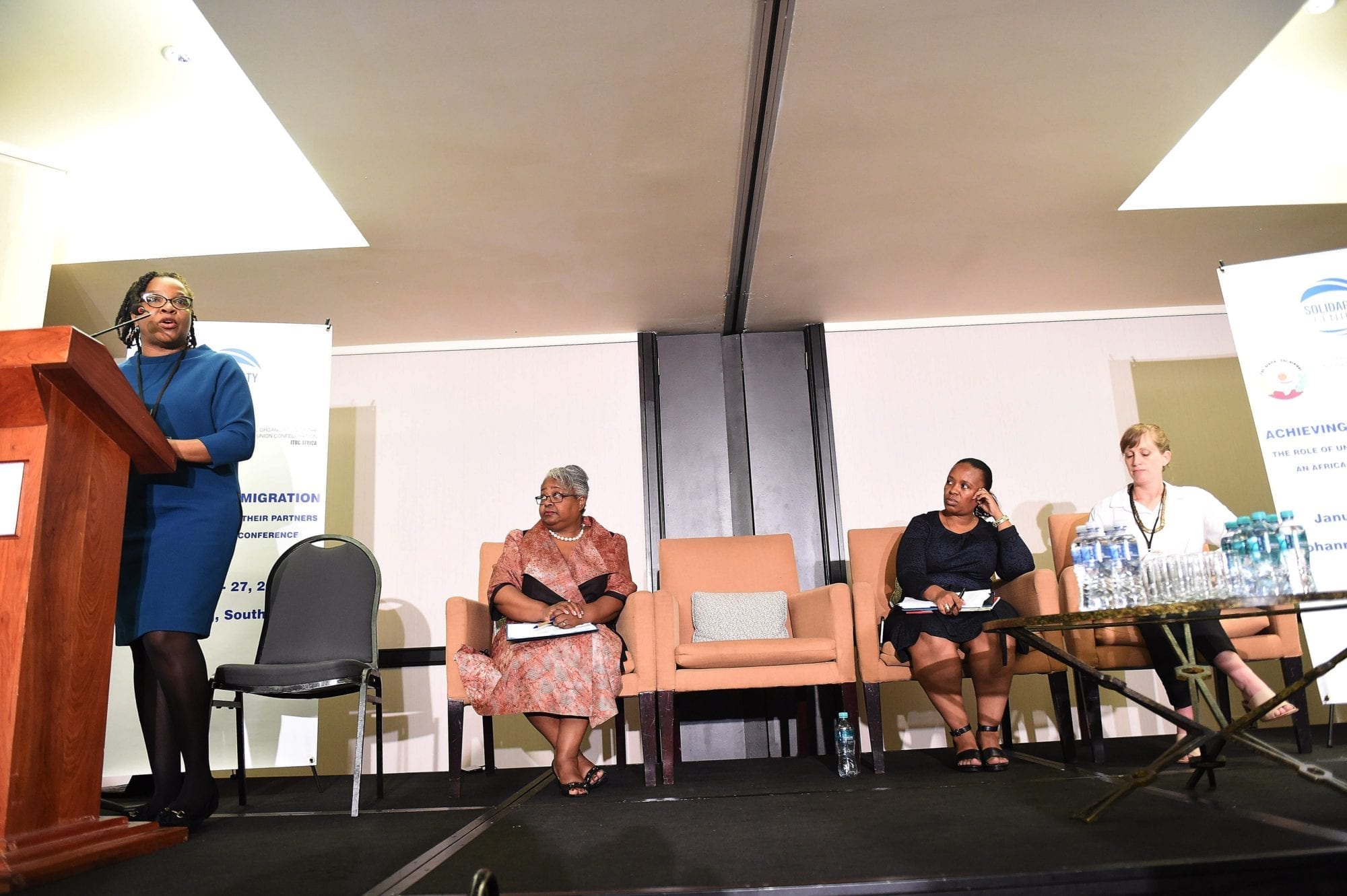
Labor Migration Conference: ‘Our Voices Will Be Strong’
“We want to make our voices heard and strong in Africa and globally. Our voices will be strong,” Joel Odigie told the more than 130 union leaders, migrant worker rights advocates and top international human rights officials in the closing session of the Solidarity Center labor migration conference in Johannesburg, South Africa.
“This wasn’t just an event,” says Odigie, coordinator of human and trade union rights for the International Trade Union Confederation-Africa (ITUC-Africa), “this was a process that is feeding to so many things.
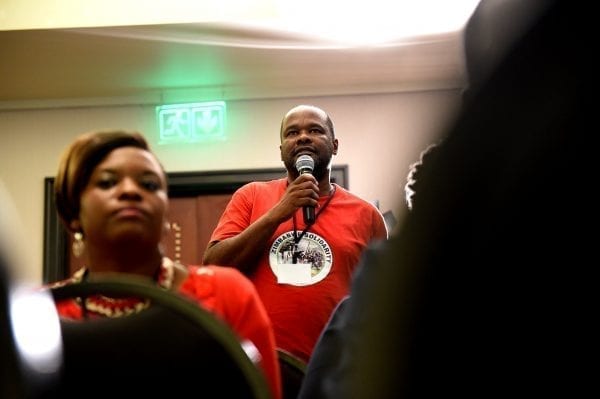
Participants at the Solidarity Center labor migration conference developed concrete strategies for empowering migrant workers. Credit: Solidarity Center/Evidence Holdings
“We see your passion,” he says, minutes before conference participants broke out into labor solidarity songs from the United States and across Africa.
Throughout the conference, “Achieving Fair Migration: Roles of African Trade Unions and Their Partners,” union leaders and migrant worker rights advocates strategized on how to improve migrant worker rights in Africa.
Following three days of discussions, dialogue and networking, participants arrived at concrete next steps around union cross-border cooperation, pre-departure assistance for workers seeking to migrate, organizing migrant workers and empowering African workers migrating to the Gulf Cooperation Council countries (Bahrain, Kuwait, Oman, Qatar, Saudi Arabia, and the United Arab Emirates).
Unions and Civil Society Organizations Working to Empower Migrant Workers
Earlier this morning, participants heard from speakers based in the United States, South Africa and the Arab Gulf region on their efforts to build networks between unions and civil society organizations to improve the working conditions of marginalized workers in a discussion moderated by Solidarity Center Africa Region Director Imani Countess,
Tanya Wallace-Gobern, executive director of the National Black Worker Center Project in North Carolina, described the expansion of U.S. worker centers, which initially focused on migrant workers, to encompass African Americans.
“Black worker centers in the South are in response to declining working conditions and declining manufacturing jobs. They are a reaction to disparate pay and discrimination,” says Goban-Wallace. Black workers in the American South historically have had little or no access to joining unions, and employers have sought to break strikes by hiring black workers.
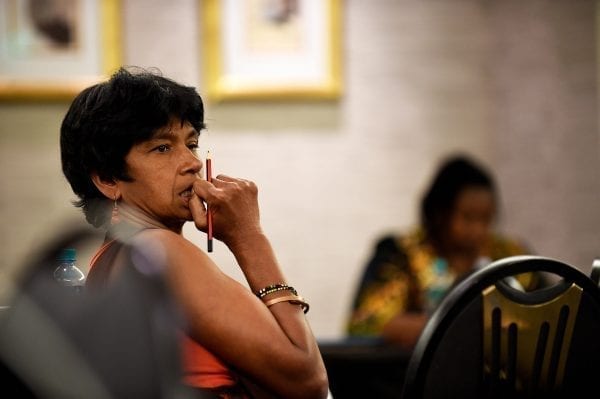
More than 130 union leaders and migrant worker rights advocates took part in the Solidarity Center labor migration conference. Credit: Solidarity Center/Evidence Holdings
The 12 black worker centers in United States provide employment aid to the underemployed and remove employment barriers to formerly incarcerated. But increasingly, says Wallace-Goban, full-time workers are contacting the center because they are experiencing racial slurs, hostility, harassment and assault on the job because the are black.
From the Congress of South African Trade Unions (COSATU), Zanele Lungie Matebula, deputy secretary of international relations, described the federation’s efforts to improve the workplace conditions of migrant domestic workers, nearly all of whom are employed in the informal economy.
In the Gulf Cooperation countries, migrant workers represent the majority of the workforce yet have few rights, including no right to form unions, says Francesca Riccardone, Solidarity Center Gulf regional program director.
Riccardone described the efforts by unions and community organizations, such as the Nigerians in Diaspora Organization (NIDO) in Qatar, to directly assist migrant workers.
Unions in countries from which workers migrate can assist by pushing governments to enact bilateral or multilateral labor agreements that include protections for workers.
The bottom line, says Riccardone: “Migration needs to work for workers.”
More Fair Labor Migration Conference Coverage
- Find full coverage of the conference on the Solidarity Center website here.
- See a photo essay on the stories of migrant workers.
- Check out Twitter with the hashtag #FairMigration and the Solidarity Center Facebook page.
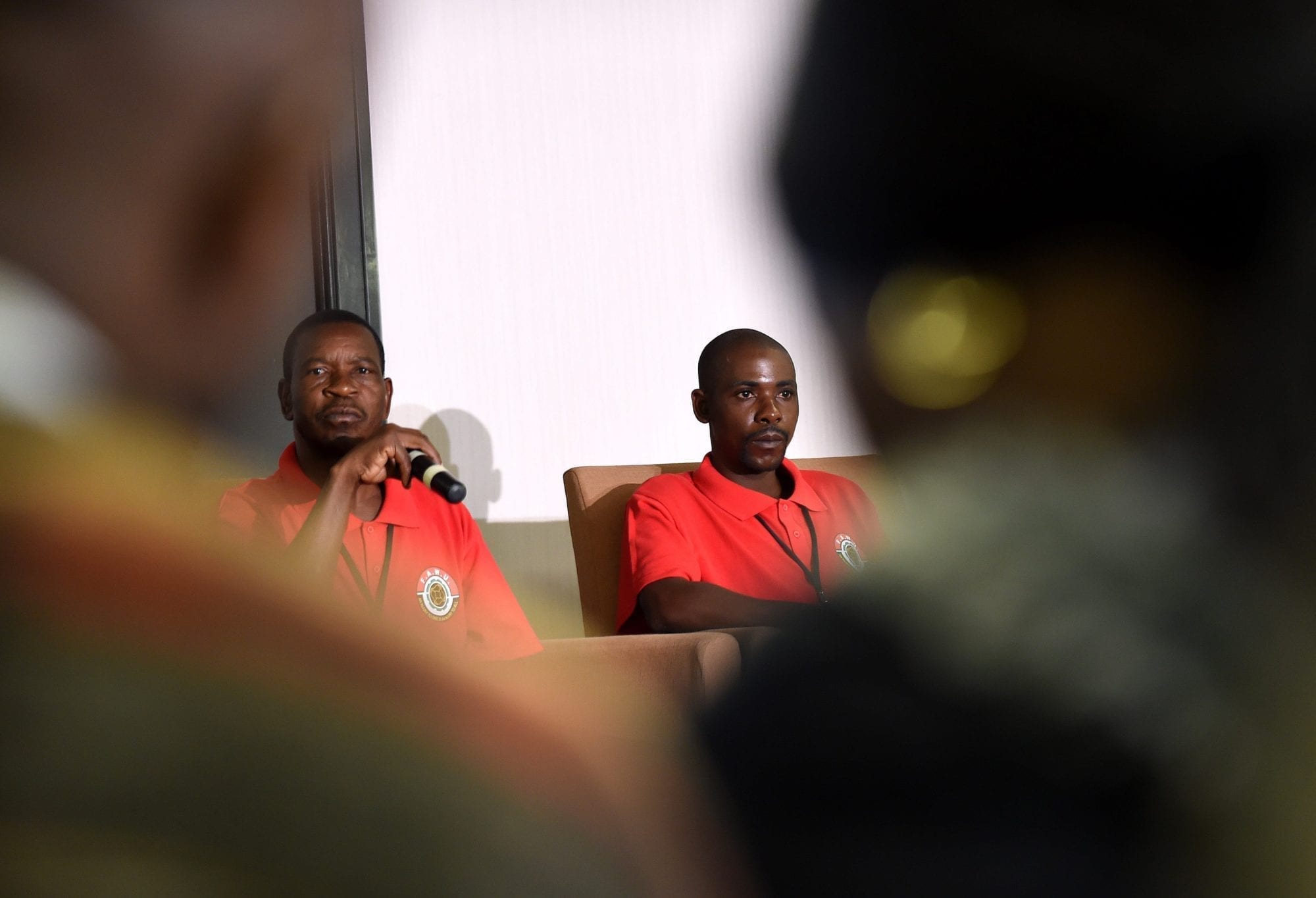
Migrant Farm Workers: Courage in the Face of Inhumanity
Seventeen years ago, Chris Muwani migrated from Zimbabwe to South Africa, where he works on a tomato farm. If he does not fulfill his daily quota, he is not paid for the day. So to complete his workload, he often does not walk the long distance to access the toilet or fresh water. On a nearby banana plantation, France Mnyike, a migrant farm worker from Mozambique, also says fresh water is hard to access.
“Some people even faint out of dizziness because of lack of water,” he says, speaking through a translator. “Two ladies fainted and eventually died because of dehydration.”
Both men spoke this morning on the final day of the Solidarity Center’s January 25–27 labor migration conference in South Africa, where more than 130 union leaders, migrant worker rights advocates and top international human rights officials from nearly two dozen countries are discussing strategies for improving migrant worker rights in Africa.
Throughout the conference, “Achieving Fair Migration: Roles of African Trade Unions and Their Partners,” union leaders and migrant rights advocates have explored the xenophobia, racism and sexism migrant workers face, and sought to increase vital connections between unions and civil society organizations to campaign for laws and policies to level the playing field for migrant workers.
Some 34 million Africans are migrants—the majority are workers moving across borders in search of jobs that can support their families. As around the world, migrant workers in Africa are cheated of wages wages (which is a modern form of forced labor) and coerced to work in dangerous and unhealthy working conditions.
“We use a chemical to spray grass but you don’t have rubber boots or a respirator but you are working with poison,” says Muwani. “If you protest about safety conditions, many people are fired.”
When Mnyike broke his leg at work, his employer did not provide medical aid and his leg remains fractured. Even if his workplace offered emergency care, says Mnyike, the employer would “deduct the cost from your salary.”
Both men also describe how they experience xenophobia at their workplaces and in their communities.
Muwani often is called derogatory names because he is from Zimbabwe, and says “even my kids are discriminated against. The kids tell them, ‘We will not play with you guys, you are not worthy of us as friends.”
Far from his wife and children, who remain in Mozambique, Mnyike continues working on the planation to support them, despite treatment so brutal that “those who die on the farm are thrown in the midst of the bananas,” he says. “They are not buried.”
Conference participants, including leadership from the South African Farm and Agricultural Workers Union (FAWU), responded by noting that we must continue to organize and recognize that workers are all African, moving beyond xenophobia.
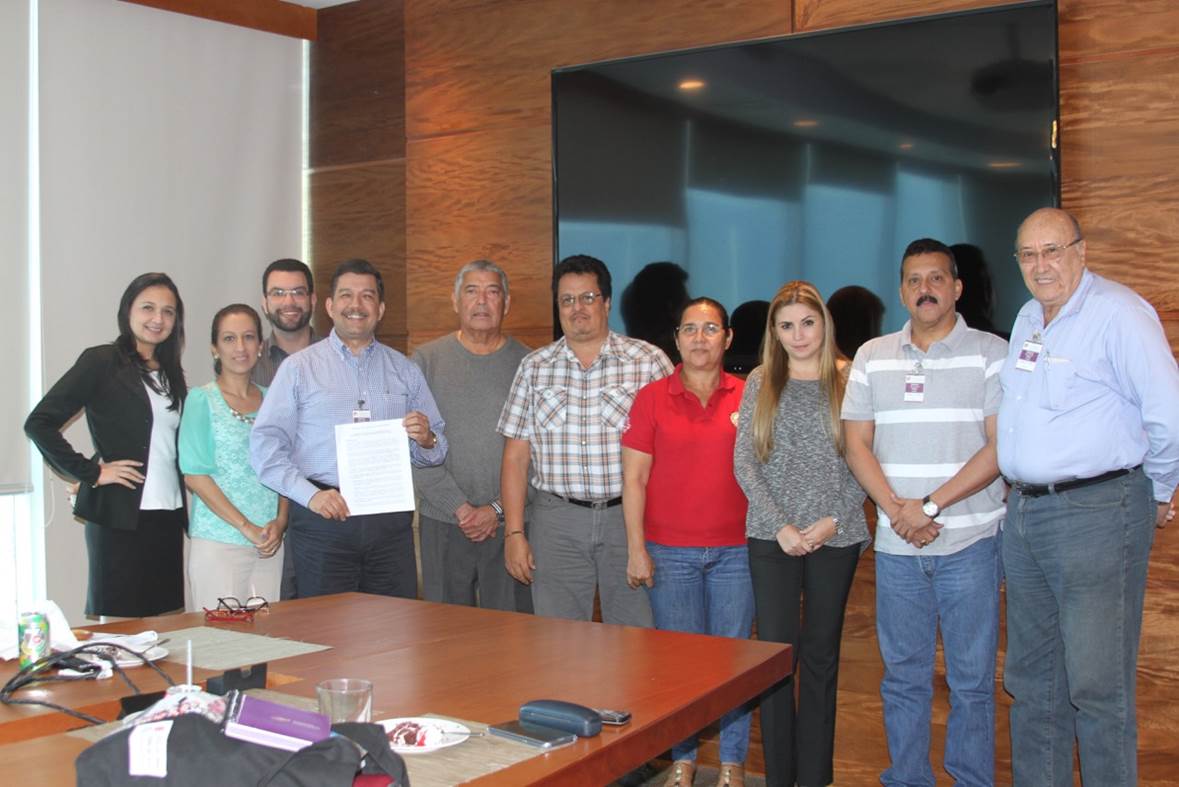
Honduran Unions Win Improved Labor Law
A four-year campaign by Honduran labor unions to improve workplaces and strengthen the rights of workers culminated with the Honduran National Congress approving a new labor inspection law last week.
Honduran unions, working in concert, successfully built a consensus with business and government to ease passage of their proposed new law. In 2015, a tripartite process (government, employers and labor unions) was initiated by the government at the urging of unions to replace the antiquated labor inspection legislation. The participating organizations were COHEP (Honduran Council of Private Enterprise), AHM (Honduran Maquila Association), Honduran Labor Ministry and the three Honduran labor centrals—General Workers Central (CGT), Confederation of Honduran Workers (CTH) and the Unified Confederation of Honduran Workers (CUTH).
The new law promotes, monitors and is designed to ensure that workplace standards, safety and health provisions and social security requirements are upheld. It includes financial penalties for violations of worker rights, including the right to form unions. Employers who threaten workers to derail the process of forming a union can be fined more than $13,000. Those who attempt to thwart a labor inspection face fines of $10,500.
Regulations regarding labor inspections and the amounts of fines for labor law violations had not been changed since passage of the Honduran Labor Code, in 1959. For decades, fines had ranged from $22 to $218. And labor inspectors had been disadvantaged by laws that protected employers over workers’ safety and rights. For example, government inspectors could not close a workplace for health and safety violations, and employers could refuse inspectors’ entry to a work site.
The Solidarity Center supported Honduran unions throughout the process, providing legal advice, analysis and other technical assistance.
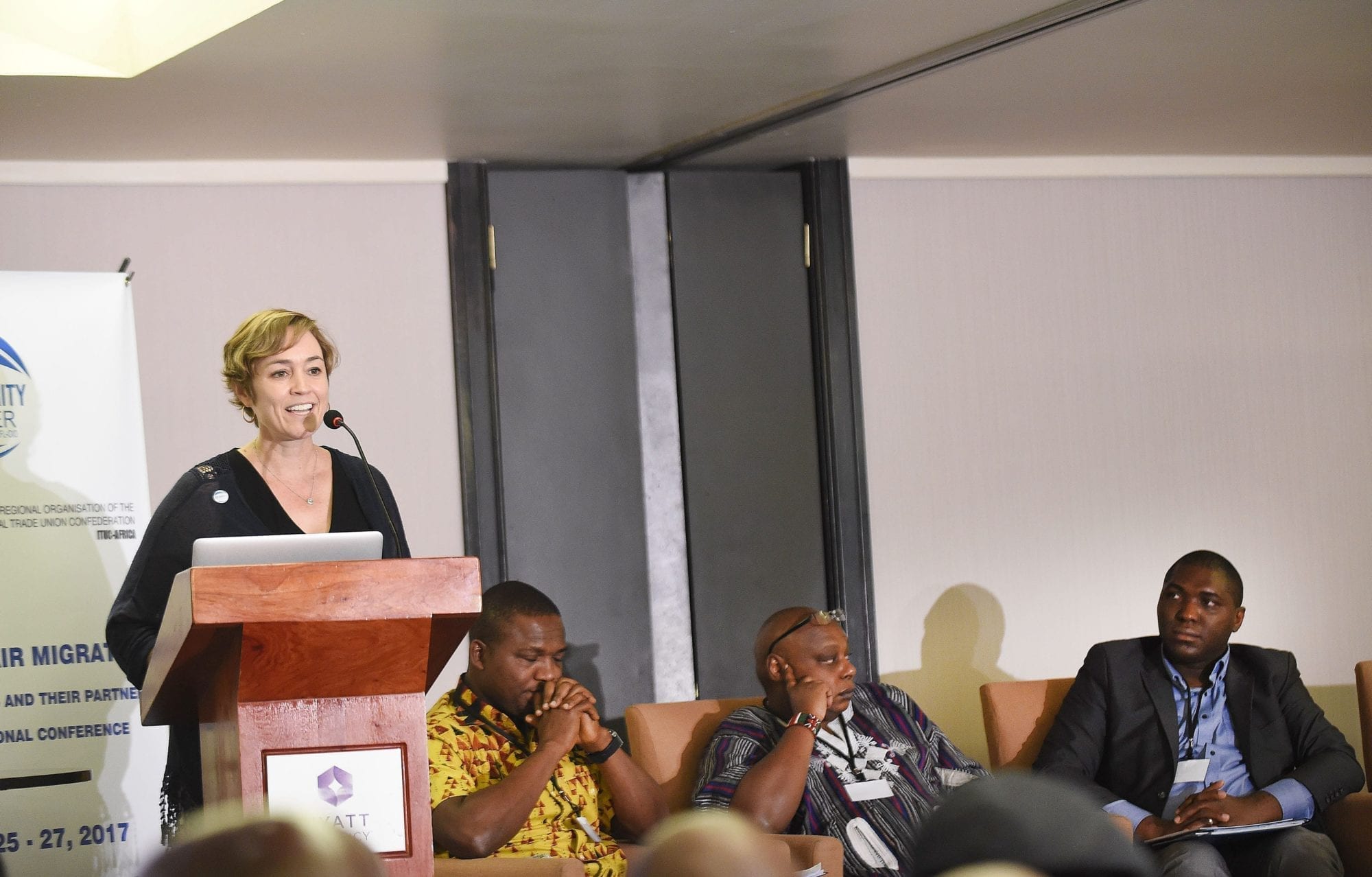
‘We Don’t Park Our Human Rights at the Border’
More than 130 union leaders, migrant worker rights advocates and top international human rights officials from nearly two dozen countries were urged to take action to improve migrant worker rights in by a range of speakers on the second day of the January 25–27 Solidarity Center fair labor migration conference. (Follow the conference on Twitter with the hashtag FairMigration and check out Solidarity Center on Facebook for regular updates.)
“More than ever before we need to reach out today to get (migrant workers) in the union,” says Joel Odigie, coordinator of human and trade union rights for the International Trade Union Confederation-Africa (ITUC-Africa). “We need to strongly prioritize the organizing of migrants.” The ITUC-Africa is co-sponsoring the conference, “Achieving Fair Migration: Roles of African Trade Unions and Their Partners” in Johannesburg, South Africa.
‘We’ve Got to Work Together’
“As the world is corporatized, we have to see how we as the 99 percent come together and deal with it,” says Maina Kiai, United Nations Special Rapporteur on the Rights to Freedom of Peaceful Assembly and of Association.

More than 130 participants are sharing strategies on empowering migrant workers at the Solidarity Center fair labor migration conference.
He described how corporate leaders compete in the global economy but close ranks when working for their interests. Odigie, Kiai and Samir Abi, the permanent secretary from the West Africa Observatory on Migration, took part in an informal conversation during the morning session.
Addressing a room filled with trade unionists and migrant worker rights advocates, Kiai urged civil society to come together across sectors to challenge concentration of wealth and power that has led to closing civic space.
“We have to ask ourselves, how are we going to deal with this 1 percent? Businesses will listen to us when we know we can effect them. How do we get the 99 percent to work together?”
In October, Kiai issued the landmark Rights to Freedom of Peaceful Assembly and of Association report on workplace rights to the UN General Assembly. The report forcefully conveys how the vast majority of the world’s workers are disenfranchised from their rights to assembly and association—rights that are fundamental to all other human rights—either by exclusion or outright oppression.
“Mobility is a right,” says Abi. And under international human rights law, we all have rights,” Kiai said. “We don’t park our human rights when we cross the border.”
Odigie agreed, saying, “The bottom line is, we’ve got to work together.”
Freedom to Forms Unions a Fundamental Human Right
Introducing Kiai, Solidarity Center Executive Director Shawna Bader-Blau said among those fundamental human rights are the “right to form unions and form associations of your choosing,” along with the right to strike right to strike.
Bader-Blau described how the power of assembly and association have led to many improvements for workers around the world, making freedom of association is “absolutely essential for migrant workers to allow them to raise their voices in the global economy.”
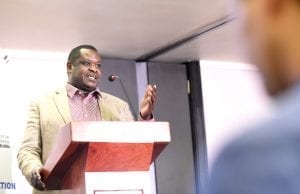
Wellington Chibebe from the ITUC, urged trade unionists to “take action on migrant workers.” Credit: Solidarity Center/Evidence Holdings
Opening the day’s session, Wellington Chibebe, International Trade Union Confederation deputy general secretary, urged trade unionists to “take action on migrant workers.”
“Let’s commit our blood to migrant workers. We did not inherit what we had from our forefathers we borrowed from future generations. What we are doing today, we are doing for future kids.”
Chibebe shared how the ITUC is working to aid migrant workers, noting the organization is prodding the International Labor Organization (ILO) to push tripartite arrangements in country to deal with migrant workers and encouraging national-level affiliates to network across borders for migrant workers.
